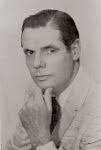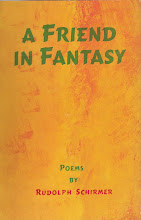An excerpt from Rudolph's novel, "A Regiment of Howards".
Certainly Howard Winbrooke did not admire, and if he did not admire, how could he possibly love Los Angeles, that piecemeal "city" for whose founding no valid reason could be adduced and whose subsequent growth, which gave no sign of slackening, was a phenomenon that baffled the informed as well as the casual observer? Yet though he did not love it, though in many ways he detested it, he had fallen, like so many others, under its bizarre enchantment. It became an addiction in which he limply acquiesced. Barriers crumbled, taboos melted away in that glittering but strangely sullied metropolis where the seasons appeared to have coalesced in a bland continuum and where the periodicity of things, elsewhere so obtrusive, had been reduced by common consent to a barely perceptible pulse-beat. More than any other community in which he had lived it had seemed to offer him release, placing no restrictions on his freedom to move in any direction he desired, allowing him to expand or contract in whatever way he chose.
The initial embrace with which it had drawn him, torn by the abrasions of New York, into a world of sprawling dimensions whose baby comforts pandered to his nervous system and in a roundabout, almost disreputable way soothed what he was pleased to call his soul - how could he ever forget it or fail to be grateful for the timely relief it had then afforded? His heart melted, his whole spirit rejoiced, an ineffable exuberance pervaded him at the memory, which time had not diluted, of his arrival in that lethargic but curiously enlivening region in which no questions were asked and no niggling standards imposed. Though certain aspects of it were distasteful, abhorrent even, to his aesthetic and moral senses, he found himself irresistibly attracted to a modus vivendi which seemed to cancel all that had gone before and with a persuasion powerful yet mild to instill in him the sense of glad prospects unfolding, of promises about to be fulfilled.
The Art and Life of Rudolph Schirmer
An Artist and a Gentleman, Rudolph Schirmer left a rich legacy of creative works - poetry, fiction, non-fiction, music - and me, his only child. This chronicle is a collaborative celebration of his life and imagination.
Liane Schirmer, 2009
Liane Schirmer, 2009
Friday, February 27, 2009
Subscribe to:
Post Comments (Atom)









No comments:
Post a Comment